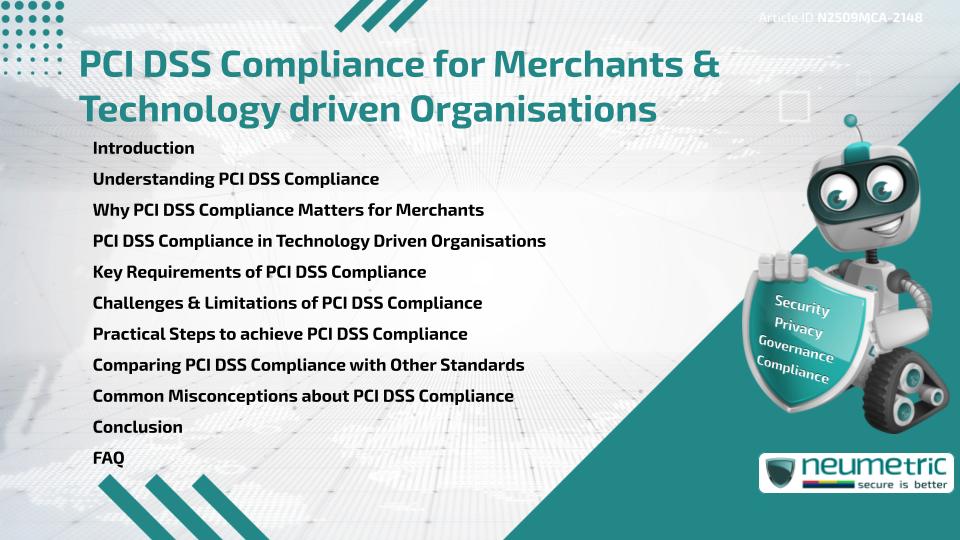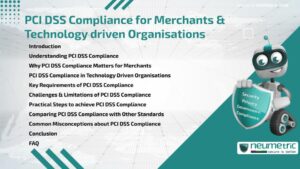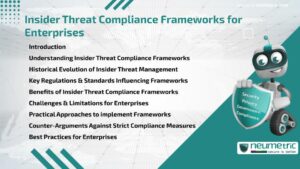Table of Contents
ToggleIntroduction
Payment Card Industry Data Security Standard [PCI DSS] Compliance is required for both Merchants & Technology based Companies. It ensures the safe handling of Payment Card Information, reduces the Risk of Fraud & builds Trust with Customers. Merchants benefit by avoiding penalties & protecting brand reputation, while Technology organisations must secure the platforms that enable card transactions. In this article, we explain what PCI DSS Compliance means, why it matters, the key requirements, common challenges & how businesses can align with it effectively.
Understanding PCI DSS Compliance
PCI DSS compliance means meeting the requirements put forth by the Payment Card Industry Security Standards Council [PCI SSC]. It was created to safeguard Sensitive Cardholder Data during storage, processing & transmission. Any Company that accepts or handles Card Payments, regardless of its size, should comply. This makes it one of the most widely applicable security standards across industries.
For context, PCI DSS compliance applies to small retailers using Card Terminals, Online Merchants & Large Technology Providers managing Global Payment Systems. The core idea is to create a standardised Framework that prevents misuse of payment information. More about the background can be found on the PCI Security Standards Council official page.
Why PCI DSS Compliance Matters for Merchants
For Merchants, Compliance is not optional. Without it, Card Networks may impose penalties or Banks may restrict access to Payment Services. Beyond Financial loss, failing to comply increases the chance of breaches, which can damage Customer Trust permanently.
Think of compliance as a lock on the door of a store. Without it, any criminal could walk in freely. PCI DSS compliance serves as that protective lock, ensuring that even if attempts are made, defences are in place.
PCI DSS Compliance in Technology Driven Organisations
Technology driven organisations face a unique challenge. While Merchants mainly handle front-end transactions, Technology providers manage Platforms that store & process vast amounts of Sensitive Data. Cloud Service Providers, Payment Gateways & Software as a Service [SaaS] companies must all align with PCI DSS Compliance.
A single Vulnerability in their systems can impact thousands of Merchants & Customers at once. Therefore, these organisations not only need to comply for themselves but also demonstrate security assurance to partners. The National Institute of Standards & Technology’s guidelines highlight similar frameworks that can complement PCI DSS requirements.
Key Requirements of PCI DSS Compliance
PCI DSS compliance is built around twelve (12) core requirements, grouped into six (6) categories:
- Building & maintaining Secure Networks & Systems
- Protecting Cardholder Data
- Maintaining a Vulnerability Management Program
- Implementing strong Access Control measures
- Monitoring & testing Networks
- Maintaining an Information Security Policy
Each requirement is further broken down into actionable tasks, such as encrypting transmissions, updating antivirus software & restricting Employee access based on roles. More details can be found at the Official PCI DSS Quick Reference Guide.
Challenges & Limitations of PCI DSS Compliance
While essential, PCI DSS Compliance has limitations. For Small Businesses, the cost of Audits, staff training & system upgrades can be significant. Technology organisations face challenges with scale, as maintaining compliance across global data centres is complex.
Another con is that Compliance does not mean complete Security. Just like wearing a seatbelt reduces but does not eliminate accident Risks, PCI DSS Compliance minimises breaches but cannot prevent them entirely.
Practical Steps to achieve PCI DSS Compliance
To make PCI DSS Compliance manageable, businesses can:
- Conduct regular self-assessments using PCI Self-Assessment Questionnaires [SAQs]
- Engage Qualified Security Assessors [QSAs] for expert guidance
- Segment payment systems to reduce scope
- Train staff on handling Sensitive Data
- Document Policies & review them periodically
Comparing PCI DSS Compliance with Other Standards
PCI DSS compliance often overlaps with other frameworks such as ISO 27001 & SOC 2. While PCI DSS focuses specifically on Payment Card Data, ISO 27001 covers broader Information Security & SOC 2 evaluates controls relevant to Data Protection in service organisations.
This comparison helps businesses identify how meeting PCI DSS requirements can contribute to wider compliance goals.
Common Misconceptions about PCI DSS Compliance
Several misconceptions surround PCI DSS Compliance:
- Only large businesses need it: All Merchants & Service Providers must comply, no matter their size.
- Compliance is a one-time task: It requires ongoing monitoring & updating.
- Technology solves everything: Compliance also depends on Employee awareness & Policies.
These myths often prevent businesses from taking the right approach to security.
Conclusion
PCI DSS compliance plays a critical role in protecting payment card data across Merchants & Technology driven organisations. It strengthens defences, builds Customer Trust & reduces the chance of Financial penalties. Although achieving compliance can be challenging, especially for smaller businesses, its benefits far outweigh the costs.
Takeaways
- PCI DSS compliance is required for all Companies handling card data.
- Merchants & Technology organisations have different but equally important responsibilities.
- Compliance involves twelve (12) core requirements covering networks, Data Protection & monitoring.
- It mitigates risks, however it does not ensure complete Security.
- Regular Audits, training & Awareness & Expert guidance makes the process simpler.
FAQ
What is PCI DSS Compliance?
Achieving PCI DSS Compliance involves adhering to the Security Standards established by the Payment Card Industry Security Standards Council, which are designed to safeguard Cardholder Data.
Who needs PCI DSS Compliance?
All Merchants, Service Providers & Technology organisations that handle Card Transactions must comply, regardless of business size.
How often should businesses review their PCI DSS Compliance?
Compliance is not a one-time event. Businesses should monitor & update systems regularly, with annual validation required for many organisations.
What happens if a company does not follow PCI DSS Compliance?
Failure to comply can result in fines, increased fees & even loss of the ability to process card payments.
Is PCI DSS Compliance the same as ISO 27001?
No, PCI DSS focuses on Payment Card Data, while ISO 27001 covers general Information Security across an organisation.
Does PCI DSS Compliance guarantee no breaches?
No security measure is foolproof. PCI DSS compliance reduces Risks significantly but does not eliminate them entirely.
Can Small Businesses achieve PCI DSS Compliance easily?
Yes, by using the PCI Self-Assessment Questionnaire & focusing on simplified controls, Small Businesses can meet requirements effectively.
References
Need help for Security, Privacy, Governance & VAPT?
Neumetric provides organisations the necessary help to achieve their Cybersecurity, Compliance, Governance, Privacy, Certifications & Pentesting needs.
Organisations & Businesses, specifically those which provide SaaS & AI Solutions in the Fintech, BFSI & other regulated sectors, usually need a Cybersecurity Partner for meeting & maintaining the ongoing Security & Privacy needs & requirements of their Enterprise Clients & Privacy conscious Customers.
SOC 2, ISO 27001, ISO 42001, NIST, HIPAA, HECVAT, EU GDPR are some of the Frameworks that are served by Fusion – a SaaS, multimodular, multitenant, centralised, automated, Cybersecurity & Compliance Management system.
Neumetric also provides Expert Services for technical security which covers VAPT for Web Applications, APIs, iOS & Android Mobile Apps, Security Testing for AWS & other Cloud Environments & Cloud Infrastructure & other similar scopes.
Reach out to us by Email or filling out the Contact Form…





